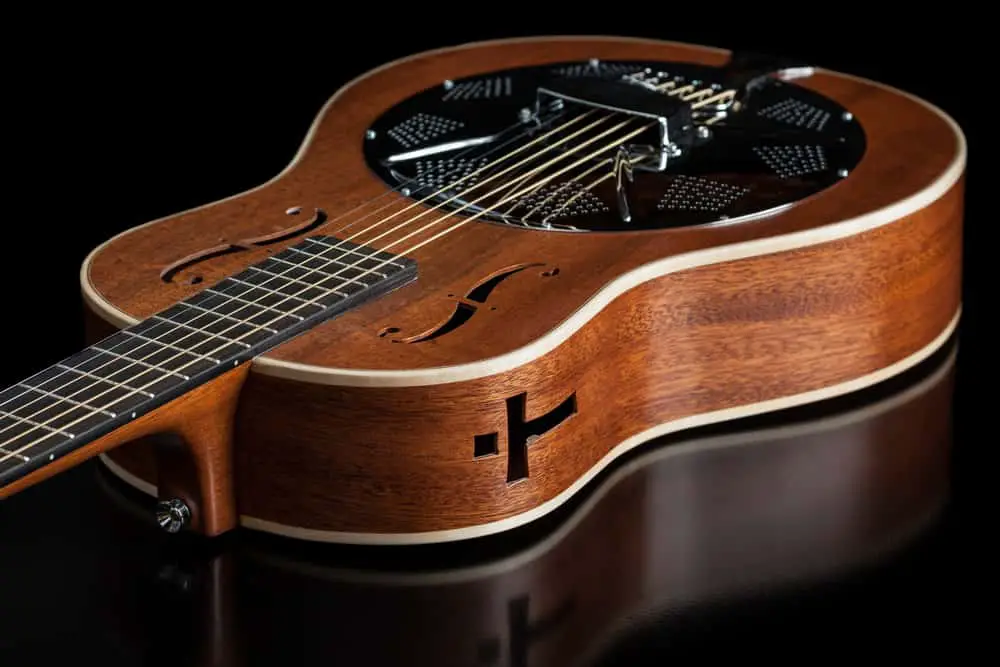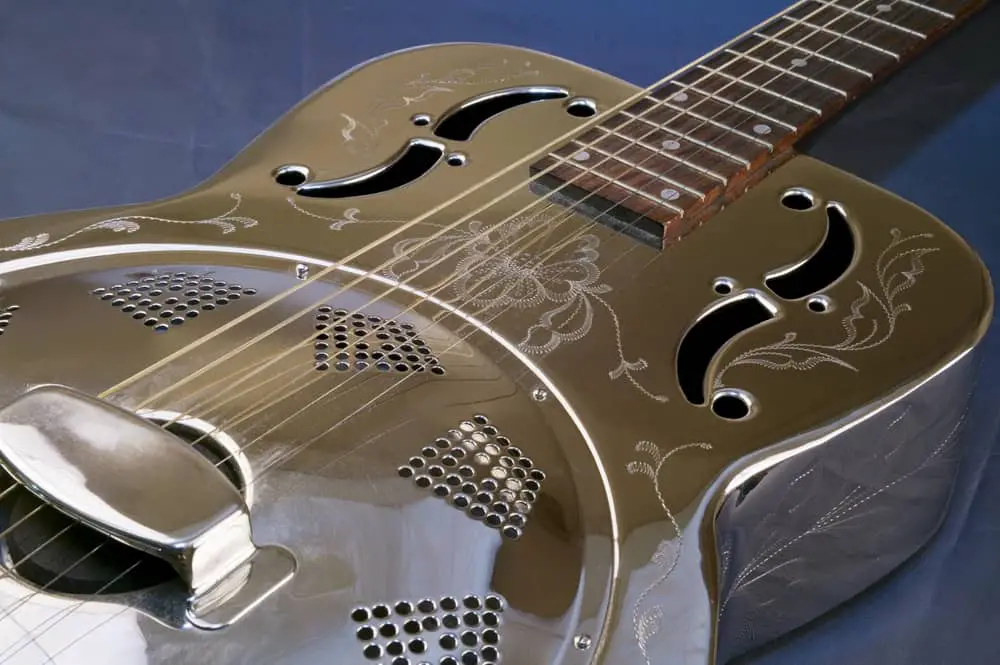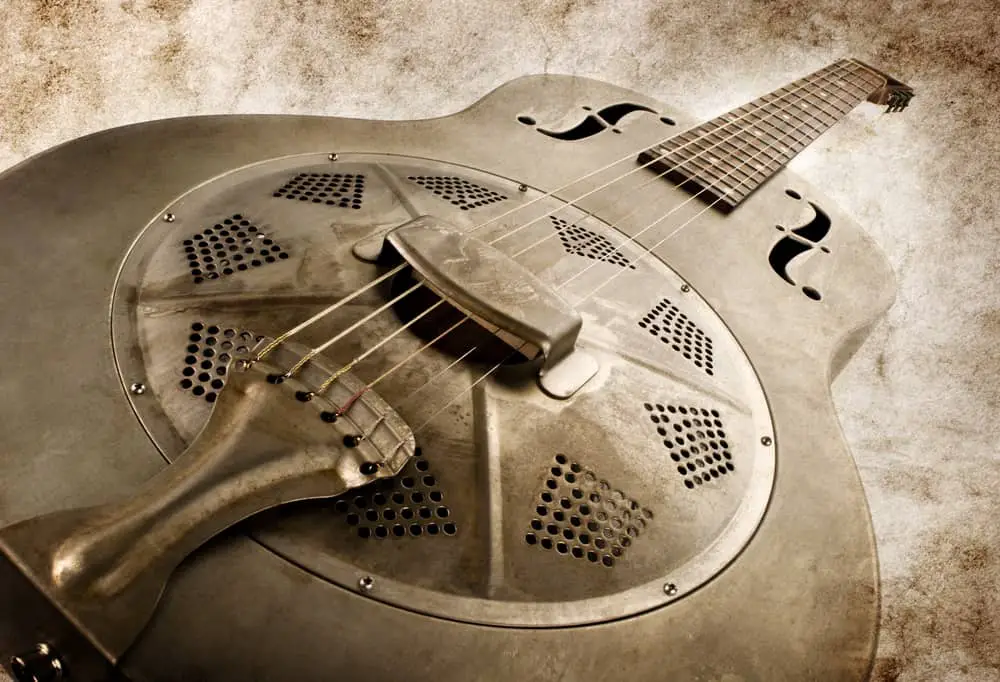
You walk into your favorite music store and see a new resonator guitar on the shelf. You’ve never played one before, but you’re curious about it. You pick it up and start to play it.
The sound is unlike any other guitar you’ve ever heard. It has a unique resonance that you can’t help but be drawn to. You ask the salesperson about the guitar, and they tell you it’s a resonator guitar.
So, what is a resonator guitar?
A resonator guitar is a type of acoustic guitar that produces a loud and clear sound with a unique resonance. It was first created in 1927 by John Dopyera and has since become a popular choice for many guitarists. It is different from other acoustic guitars in that it has a metal cone or “resonator” that amplifies the sound of the strings.
If you’ve ever wondered what a resonator guitar is, how it works, or what benefits come with playing one, read on for everything you need to know.
What Is a Resonator Guitar?

If you’ve ever seen a slide guitar in person, you’ve likely seen a resonator guitar. A resonator guitar (also called resophonic guitar) is a type of acoustic guitar that produces sound by using one or more metal cones (resonators) to vibrate and amplify the sound. These cones are placed under the strings.
The cones are typically made of Aluminum metal but can also be made of other materials such as glass or ceramic.
Resonator guitars were originally designed to be louder and more powerful than traditional acoustic guitars, making them well-suited for use in country, blues, and other genres of music where a louder guitar is desired.
Today, resonator guitars are still used in many of these same genres, but they have also gained popularity in other genres such as rock and metal.
Resonator guitars typically have a round body shape and may be equipped with one or more pickups to allow them to be played through an amplifier. Some resonator guitars also have a secondary “resonator” cone located in the middle of the body, which can be used to produce a different tone.
If you’re looking for an instrument that will give your music an unmistakable twang, a resonator guitar is a perfect choice!
History of Resonator Guitar

The first commercial resonator guitar was invented in 1927 by John Dopyera when he partnered with George Beauchamp to produce something different. The two men were working on a new type of guitar that would be louder and more responsive than anything on the market.
They soon came up with the idea of using metal cones to amplify the sound of the strings. The resonator guitar quickly became a hit, and Dopyera and Beauchamp founded the National String Instrument Corporation to mass-produce their new invention.
The very first model of resonator guitar released was called a Tricone. It was a metal-bodied instrument consisting of three aluminum resonators.
After some time, George Beauchamp’s conflicting design and business philosophies led Dopyera to leave National String Instrument Corporation. Dopyera then, along with his four brothers, formed the Dobro Manufacturing Company in the early 1930s under the name of National-Dobro Corporation.
The Dobro company’s design, with a single inverted conical aluminum resonator, quickly became the standard for the instrument. Dobro is now owned by Gibson Guitar Corporation.
How Does a Resonator Guitar Work?
If you’ve ever seen a resonator guitar, you know it looks pretty different from a regular acoustic guitar. It has a metal cone in the body that amplifies the sound, and it’s usually played with a slide instead of frets.
But how does it work?
The metal cone in a resonator guitar is called a “resonator,” and it helps amplify the sound of the strings. The resonator is connected to the bridge, and when the strings are plucked, the resonator vibrates along with them. This amplifies the sound of the strings and gives the resonator guitar its unique tone.
Resonator guitars are typically played with a slide – a metal or glass rod used to press down on the strings. This allows the player to create different pitches without using frets. Slide guitar playing is a unique style that takes some practice to master, but it can produce beautiful sounds.
Different Types of Resonator Guitars

There are many different types of resonator guitar, each with its unique sound.
Dobro
The most common type of resonator guitar is the Dobro, which has a metal body and a single cone. Dobros are typically played with a slide, and their sound is often described as “twangy.”
National
Another popular type of resonator guitar is the National, which has a wooden body and two cones. Nationals are known for their “jangly” sound, and they’re often used in country and bluegrass music.
Weissenborn
If you’re looking for a resonator guitar with a mellow sound, you might want to try a Weissenborn. These guitars have a hollow body and four cones, and they’re often used in Hawaiian music.
There are many other modifications of resonator guitars like Tricone, Square Neck, Round Neck, Biscuit Style, and Spider Style guitars.
Whatever your musical style, there’s sure to be a resonator guitar perfect for you.
Benefits of Playing a Resonator Guitar
Following are the reasons why you should try playing a resonator guitar.
- The resonator guitar is suited for multiple genres, including blues, country, and folk.
- Because it is easy to learn and play, the resonator guitar is a popular choice for beginners.
- Resonator guitars are affordable, making them an excellent option for budget-conscious musicians.
- Playing the resonator guitar can be highly beneficial for those looking for a therapeutic outlet.
- The calming nature of the instrument can help to boost creativity and confidence.
So, the resonator guitar is ideal for anyone who wants to explore their musical side.
Final Words
If you’re looking for an acoustic guitar with a unique and powerful sound, the resonator guitar is worth checking out. These guitars have a metal cone in the body that amplifies the sound, and they’re typically played with a slide instead of frets.
Resonator guitars have been around for nearly a century and continue to be popular among musicians of all genres. Whether you’re a beginner or an experienced guitarist, the resonator guitar can add a new dimension to your music.









